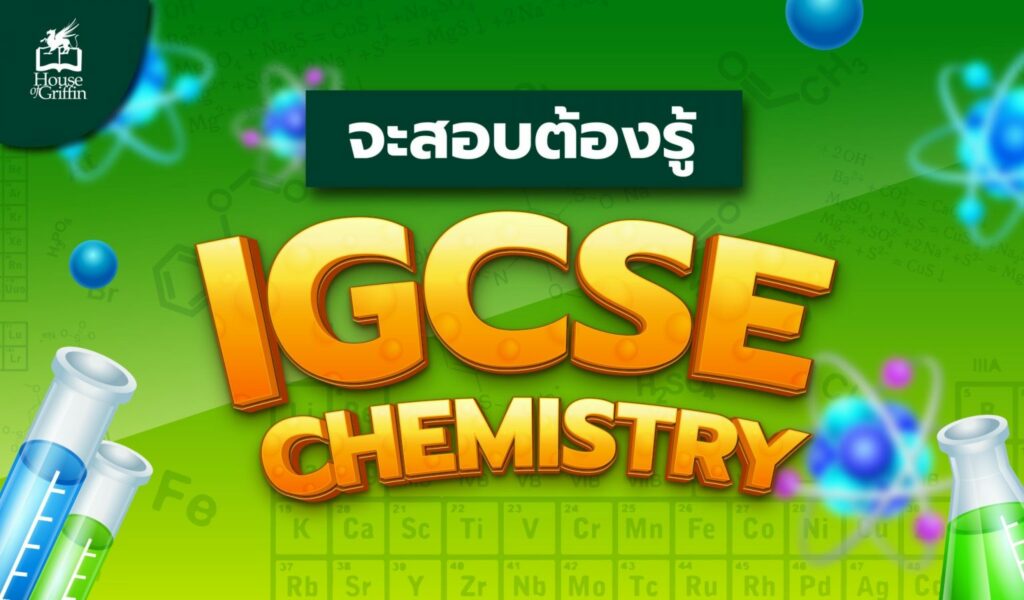
ใครที่จะสอบ IGCSE Chemistry 0620 ต้องศึกษาโครงสร้างข้อสอบและหัวข้อเรื่องที่จะออกสอบให้เข้าใจดี ซึ่งก่อนอื่น ต้องทำความเข้าใจก่อนว่า IGCSE นั้นจะมี Examination Board 2 บอร์ดหลักด้วยกัน คือ
- Cambridge International Examination (CIE) และ
- Pearson Edexcel โดยข้อสอบ
แต่ละบอร์ดนั้น ก็จะมีรายละเอียดแตกต่างกัน ในที่นี้ จะอธิบายโครงสร้างข้อสอบและเนื้อหาที่ออกสอบ แบ่งตามประเภทของบอร์ด เพื่อให้เข้าใจได้ง่ายขึ้น
Cambridge International Examination (CIE)
โครงสร้างข้อสอบ IGCSE Chemistry ของ CIE
การสอบ IGCSE มีรูปแบบการสอบให้สามารถเลือกได้ว่าจะสอบแบบ Core หรือ Extended Papers โดยมีรายละเอียดที่ต่างกันคือ
- Core Paper: เนื้อหาข้อสอบที่ออกจะง่ายกว่าแบบ Extended โดยเกรดสูงสุดที่ผู้สอบจะสามารถทำได้ คือเกรด C
- Extended Papers: เนื้อหาข้อสอบจะมีส่วนที่ทับซ้อนกับเนื้อหาแบบ core แต่จะมีเนื้อหาที่เพิ่มเติมและซับซ้อนกว่าแทรกเข้ามาด้วย โดยเกรดสูงสุดที่ผู้สอบจะสามารถทำได้ คือเกรด A*
สำหรับผู้ที่เลือกสอบแบบ Core Paper จะต้องสอบทั้งหมด 3 Paper คือ Paper 1, 3, 5 โดยมีรายละเอียดดังนี้
Paper | เวลาสอบ | ลักษณะของการตอบคำถาม |
|---|---|---|
Paper 1 – Multiple Choices | 45 นาที | ตอบคำถามแบบมีตัวเลือก |
Paper 3 – Theory: Short Answer & Structured Question | 1 ชั่วโมง 15 นาที | ตอบคำถามแบบสั้นและบรรยาย |
Paper 5 – Practical Test (Experiment) | 1 ชั่วโมง 15 นาที | ตอบคำถาม โดยข้อสอบจะให้การทดลองมา แล้วให้วิเคราะห์โดยใช้ความรู้ทางเคมีมาตอบ |
สำหรับผู้ที่เลือกสอบแบบ Extended Paper จะต้องสอบทั้งหมด 3 Paper คือ Paper 2, 4, 6 โดยมีรายละเอียดดังนี้
Paper | เวลาสอบ | ลักษณะของการตอบคำถาม |
|---|---|---|
Paper 2 – Multiple Choices | 45 นาที | ตอบคำถามแบบมีตัวเลือก |
Paper 4 – Theory: Short Answer & Structured Question | 1 ชั่วโมง 15 นาที | ตอบคำถามแบบสั้นและบรรยาย |
Paper 6 – Practical Test (Experiment) | 1 ชั่วโมง | ตอบคำถาม โดยข้อสอบจะให้การทดลองมา แล้วให้วิเคราะห์โดยใช้ความรู้ทางเคมีมาตอบ |
Topics ที่ออกสอบของ IGCSE Chemistry
- Atomic structure and the periodic table
- Structure, bonding and the properties of matter
- Periodicity
- Quantitative chemistry (Stoichiometry/mole concept)
- Electricity and Electrochemistry
- Chemical reactions
- Acids, bases and salts
- The rate and extent of chemical change
- Energy changes
- Organic chemistry
Pearson Edexcel
โครงสร้างข้อสอบ IGCSE Chemistry ของ Pearson Edexcel
รูปแบบการสอบ ผู้สอบจะสอบ 2 Paper คือ Paper 1 และ Paper 2 (Grade 1-9)
Paper | เวลาสอบ | ลักษณะของการตอบคำถาม |
|---|---|---|
Paper 1 | 2 ชั่วโมง | มีทั้งหมด 4 ประเภทคำตอบ คือ
|
Paper 2 | 1 ชั่วโมง 15 นาที |
Topics ที่ออกสอบ
1. Principles of chemistry
- States of matter
- Elements, compounds and mixtures
- Atomic structure
- The Periodic Table
- Chemical formulae, equations and calculations
- Ionic bonding
- Covalent bonding
- Metallic bonding
- Electrolysis
2. Inorganic Chemistry
- Group 1 (alkali metals) – lithium, sodium and potassium
- Group 7 (halogens) – chlorine, bromine and iodine
- Gases in the atmosphere
- Reactivity series
- Extraction and uses of metals
- Acids, alkalis and titrations
- Acids, bases and salt preparations
- Chemical tests
3. Physical Chemistry
- Energetics
- Rates of reaction
- Reversible reactions and equilibria
4. Organic Chemistry
- Introduction
- Crude oil
- Alkanes
- Alkenes
- Alcohols
- Carboxylic acids
- Esters
- Synthetic polymers
Note: Paper 1 และ Paper 2 จะออกข้อสอบ Content เดียวกัน แต่ต่างกันตรงที่ไม่ออกข้อสอบซ้ำเรื่องกัน
จะเห็นว่า ตัวข้อสอบ IGCSE Chemistry ทั้งของบอร์ด CIE และ Edexcel นั้น มีรายละเอียดแตกต่างกันอยู่ และแม้เนื้อหาจะไม่ต่างกัน แต่ลักษณะการทำข้อสอบจะต่างออกไป ดังนั้น จึงควรเตรียมตัวเพื่อให้เข้าใจลักษณะข้อสอบไว้ก่อน และที่สำคัญ ควรฝึกทำ Past paper ซึ่งก็จะช่วยทำให้คุ้นเคยกับข้อสอบได้ดียิ่งขึ้น
AS LEVEL และ A LEVEL CHEMISTRY
ข้อสอบ AS LEVEL และ A LEVEL CHEMISTRY นั้น มี Examination board 2 บอร์ดหลัก เช่นเดียวกันคือ Cambridge International Examination (CIE) และ Pearson Edexcel ในที่นี้จะกล่าวถึงรายละเอียดโครงสร้างข้อสอบและเนื้อหาที่ออกสอบของข้อสอบ AS LEVEL และ A LEVEL CHEMISTRY 9701 ของบอร์ด CIE ซึ่งแบ่งตามระดับ ดังนี้
1. AS LEVEL: ผู้สอบสามารถได้เกรดสูงสุดคือ A
2. A LEVEL: ผู้สอบสามารถได้เกรดสูงสุดคือ A*
AS Examination (Advanced Subsidiary)
Paper | เวลาสอบ | คะแนน | น้ำหนักคะแนน (ผู้สอบหากจบ AS level) | ลักษณะของการตอบคำถาม |
|---|---|---|---|---|
Paper 1 Multiple Choices | 1 ชั่วโมง 15 นาที | 40 marks | 31% | ตอบคำถามแบบมีตัวเลือก |
Paper 2 Short Answer | 1 ชั่วโมง 15 นาที | 60 marks | 46% | ตอบคำถามแบบสั้นและบรรยาย |
Paper 3 Advance Skill | 2 ชั่วโมง | 40 marks | 23% | ข้อสอบจะให้วิเคราะห์โดยใช้ความรู้ทางเคมีมาตอบ มีทั้งคำนวณและการทดลอง |
A Level
Paper | เวลาสอบ | คะแนน | น้ำหนักคะแนน (ผู้สอบที่จบถึง A Level) | ลักษณะของการตอบคำถาม |
|---|---|---|---|---|
Paper 1 Multiple Choices | 1 ชั่วโมง 15 นาที | 40 marks | 15.5% | ตอบคำถามแบบมีตัวเลือก |
Paper 2 Short Answer | 1 ชั่วโมง 15 นาที | 60 marks | 23% | ตอบคำถามแบบสั้นและบรรยาย |
Paper 3 Advance Skill | 2 ชั่วโมง | 40 marks | 11.5% | ข้อสอบจะให้วิเคราะห์โดยใช้ความรู้ทางเคมีมาตอบ มีทั้งคำนวณและการทดลอง
มีทั้งคำนวณ ตอบแบบสั้น และบรรยาย |
Paper 4 A Level Structured Questions | 2 ชั่วโมง | 100 marks | 38.5% | ข้อสอบจะให้วิเคราะห์โดยใช้ความรู้ทางเคมีมาตอบ มีทั้งคำนวณและการทดลอง
มีทั้งคำนวณ ตอบแบบสั้น และบรรยาย โดย paper 4-5 จะสำหรับผู้สอบที่ต่อ A level จนจบโดย เนื้อหาจะลงลึกมากกว่า |
Paper 5 Planning, Analysis and Evaluation | 1 ชั่วโมง 15 นาที | 30 marks | 11.5% | ข้อสอบจะให้วิเคราะห์โดยใช้ความรู้ทางเคมีมาตอบ มีทั้งคำนวณและการทดลอง
มีทั้งคำนวณ ตอบแบบสั้น และบรรยาย โดย paper 4-5 จะสำหรับผู้สอบที่ต่อ A level จนจบโดย เนื้อหาจะลงลึกมากกว่า |
Topics ที่ออกสอบ
1. Physical chemistry
- Atoms, molecules and stoichiometry
- Atomic structure
- Chemical bonding
- States of matter
- Chemical energetics
- Electrochemistry
- Equilibria
- Reaction kinetics
- hermodynamics*
- Rate equations*
- Equilibrium constant Kp for homogeneous systems *
- Electrode potentials and electrochemical cells *
- Acids and bases *
2. Inorganic chemistry
- The Periodic Table: chemical periodicity
- An introduction to the chemistry of
transition elements - Nitrogen and sulfur
- Properties of Period 3 elements and their oxides *
- Transition metals*
- Reactions of ions in aqueous solution*
3. Organic chemistry and analysis
- An introduction to organic chemistry
15 Hydrocarbons - Halogen derivatives
- Hydroxy compounds
- Carbonyl compounds
- Polymerisation
- Analytical techniques
- Organic synthesis
- Optical isomerism*
- Aldehydes and ketones*
- Carboxylic acids and derivatives*
- Aromatic chemistry*
- Amines*(m)Polymers*
- Amino acids, proteins and DNA *
- Organic synthesis*
- Nuclear magnetic resonance spectroscopy*
Note (*) หมายถึง หัวข้อที่พบได้เฉพาะ A Level เท่านั้น โดยมีเนื้อหาเกินมาจาก AS Level
เป็นอย่างไรกันบ้างครับสำหรับข้อสอบ IGCSE Chemistry/ A Level ทั้งนี้ House of griffin เรามี Course IGCSE Chemistry/ A Level โดยทีมครูคุณภาพ ขนเนื้อหาแบบเจาะลึกเข้มข้น พร้อมทั้งให้ข้อมูลการสอบ เพื่อให้น้องๆ พิชิตทุกสนามสอบ และเทคนิคการทำข้อสอบ ให้ได้คะแนนแบบ A* ได้อย่างมั่นใจ ไว้มาเจอกับคุณครูนะ

